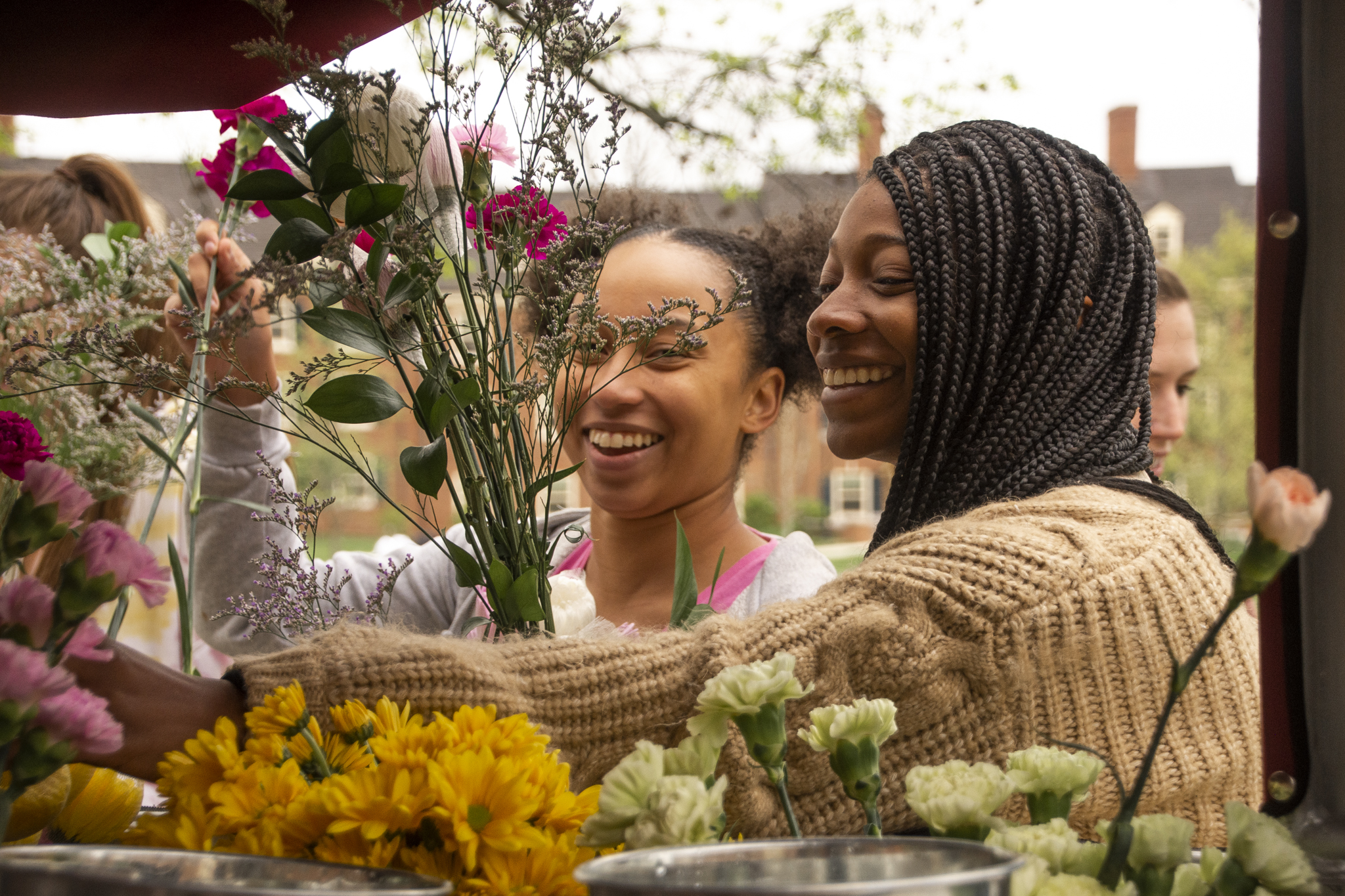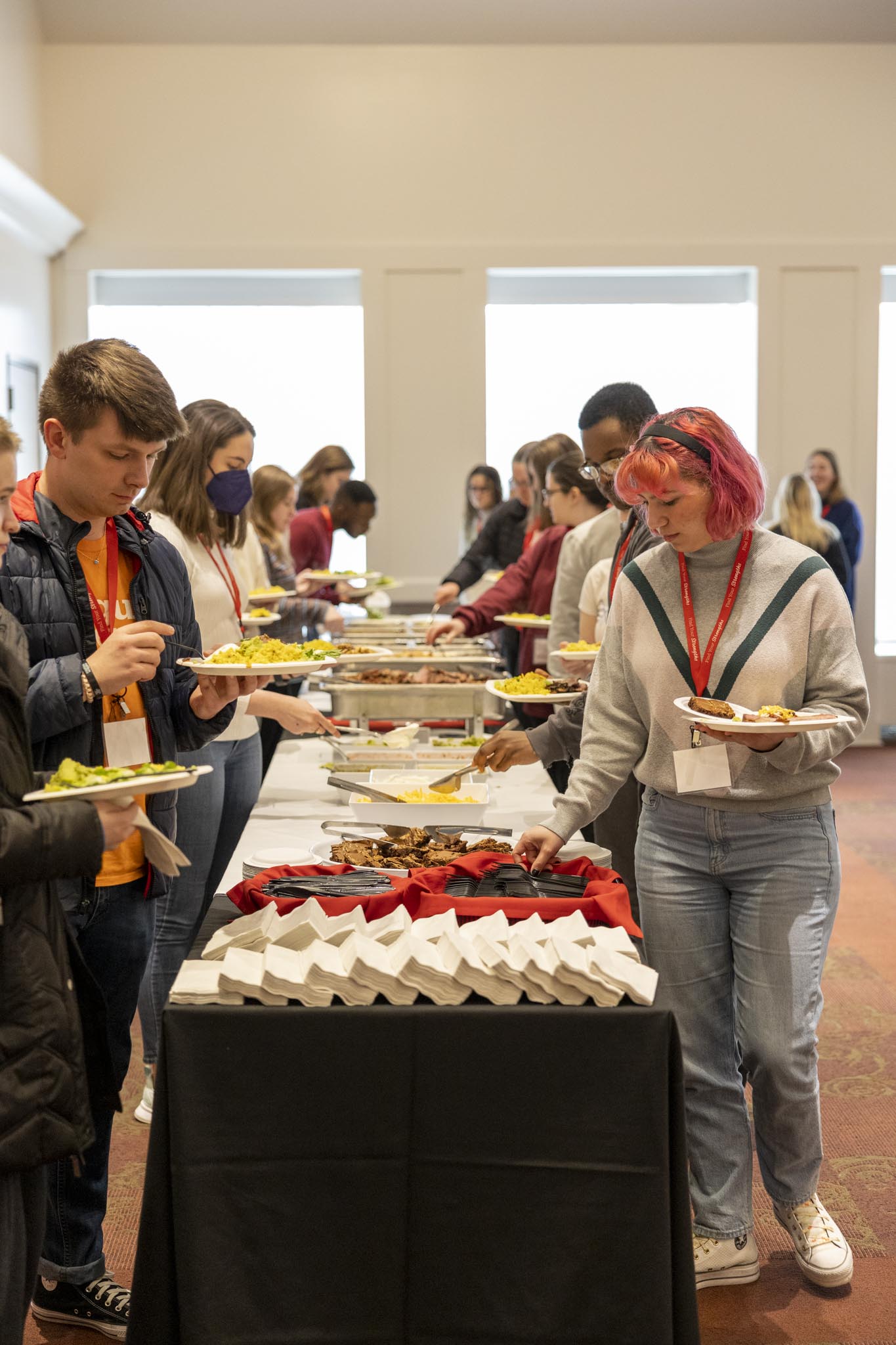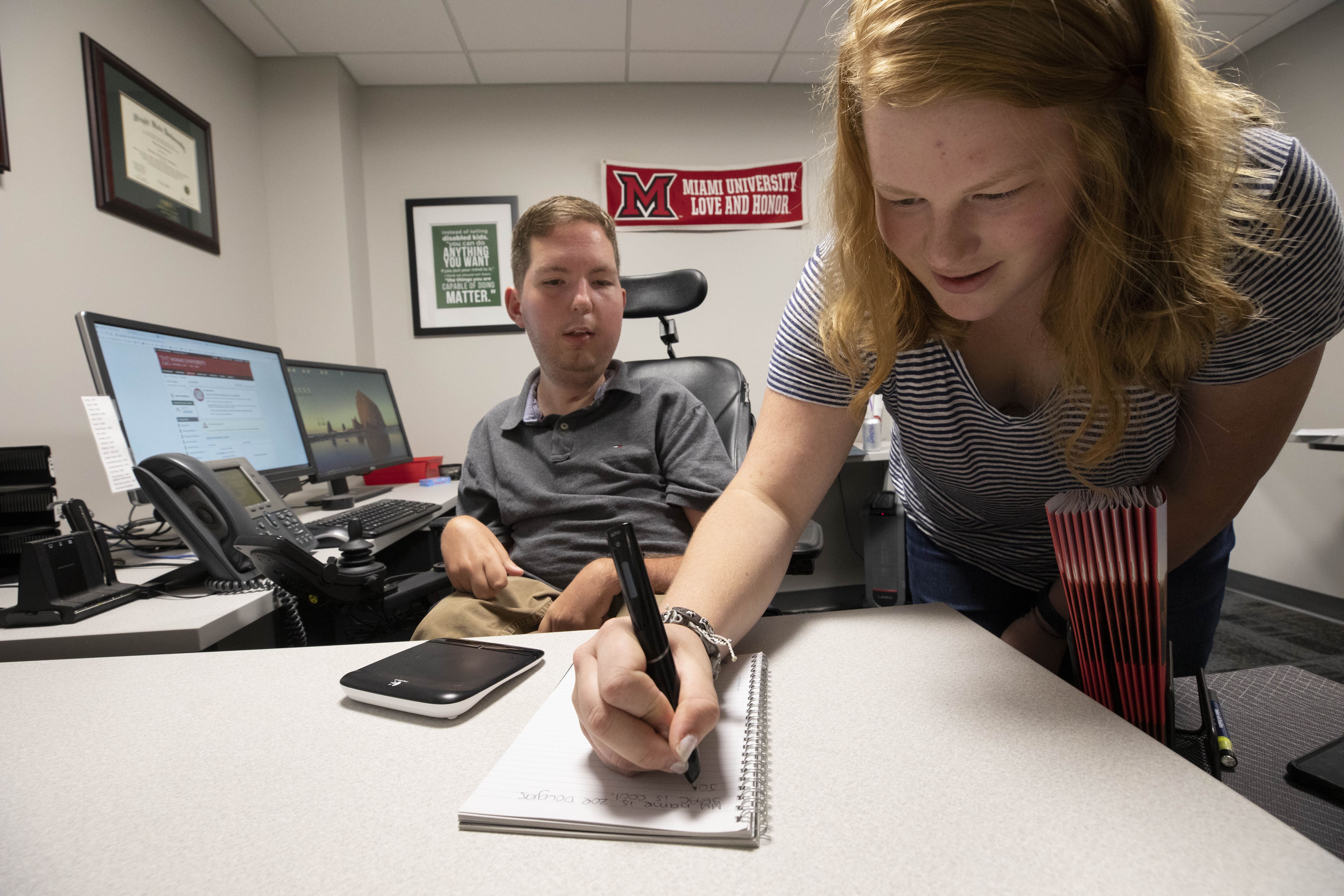Inclusive Programming Guide

To further our efforts in creating an inclusive and accessible environment, we have developed an Inclusive Programming Guide. This guide offers students resources and links to help plan events, seminars, and activities that prioritize inclusivity and accessibility. Included are contacts, links, and brief descriptions of resources that will enhance the experience of attendees. Please note that this guide is not holistic of all considerations and not all will be achieved based on space, resources, and timeline constraints.
Download a PDF version of this guide
Land Acknowledgement | Myaamia Center
A land acknowledgement is a formal statement, usually presented at the beginning of public events and gatherings to recognize and honor the land upon which the Institution was built as well as the Indigenous peoples who have and continue to cultivate relationships within their homelands.
Considerations:
- Read the Land Acknowledgement in its entirety.
- Include the Land Acknowledgement in reading materials and presentation slides.
Miami's Land Acknowledgement was created in consultation with the Myaamia Center to ensure that the content is accurate and to address critiques made by the Indigenous communities.
Learn more at the Land Acknowledgement webpage
Event Security | Miami University Police Department
MUPD recognizes that at special events officers may be requested to promote event support and further the community you intend to build. You may request a specific number of officers needed for your event, but the Miami University Police Department will be responsible for assessing the proper number of officers needed based on factors such as crowd size, type of event, location, etc.
Request officer and learn more on the event security webpage
Religious Holidays | Office of Institutional Diversity and Inclusion
There are many of religious holidays and holy days observed by members of the Miami University community. The Office of Institutional Diversity and Inclusion shares a list of dates to be aware of. This is not an exhaustive list. If you would like to suggest additions or edits please send your suggestions to VPdiversity@MiamiOH.edu.
Some groups are not only a religious community but also a cultural and ethnic community comprising individuals that range from religiously observant to not-at-all religiously observant but identifying as ethnically and/or culturally.
- Visit the religious holidays webpage for a list of holidays, traditional days of observance, and important days of religious significance.
- This is not a comprehensive list of dates and a more detailed list can be found at www.interfaith-calendar.org.
Dining Accommodations | Catering and Campus Dining
Miami University provides an exceptional on-campus dining and catering experience that takes into consideration medical needs, lifestyle choices, cultural backgrounds, and religious affiliations. Meal plans are available to all Miami University students. Dining Services is proud to offer a choice of meal plans that add convenience to our students’ lives.
- Provide inclusive menus considering common food allergies, lifestyle restrictions such as vegan/vegetarianism, religious dietary restrictions, and range of taste preferences.
- Strive to coordinate individualized meal accommodations for guests with extensive dietary restrictions.
- Ensure that food is clearly labeled and common food allergens are identified. Work with catering providers to have clear and complete ingredient lists of food served at events.
Inclusive Branding | University Communications and Marketing
At Miami University, we strive to be a community where all cultures and identities are celebrated — a place where ideas can be freely exchanged, can be modified, and can evolve. We know that new perspectives and experiences make us better, not only as individuals but as a university community.
- Ensure that photos do not perpetuate stereotypes. Be intentional about using photo compositions and subjects that ensure we’re telling our authentic, inclusive brand story.
- Consider AccessMU's guidelines for being inclusive on topics including Anxiety, Autism Spectrum, Deaf and Hard of Hearing, Dyslexia, Low Vision, Physical or Motor Disabilities, and screen readers.
- Consider AccessMU's page on creating accessible content.
Learn more about University Communications and Marketing's Inclusive Branding
Reporting Concerns including Bias, Harassment, or Discrimination | Equity and Equal Opportunity
If an incident does arise that makes you feel uncomfortable or concerned regarding bias, harassment, discrimination, or other incidents, know that there is support to ensure individual students and future events continue to thrive.
Report concerns including bias incidents, hate crimes, ethical concerns, as well as students in distress who may need additional resources.
Learn more about reporting forms
Gender Inclusivity | Center for Student Diversity and Inclusion
Having building space with bathroom facilities that are ADA-accessible and open to people of any gender is an important way to make sure that all members of the campus community have access to spaces that meet their basic needs. We will continue to update the map below.
When planning a program, look for locations that include easy access to gender-inclusive restrooms. This will help your event be more inclusive of trans, nonbinary, and gender diverse students.
Also, don’t assume that you know the gender identity of individuals at your event, or that you know what restroom they would be most comfortable in. At the start of your event, let everyone know where the closest mens, womens, and gender-inclusive restrooms are.
Learn more about where to find gender-inclusive restrooms on campus
Disability Access | Miller Center for Student Disability Services
Accessibility is important when planning an event because it helps to ensure that everyone can participate and fully enjoy the event. By considering the needs of all attendees and making accommodations, organizers can create an inclusive and welcoming environment for everyone.
Recognizing that attendees may have diverse access needs is crucial. Not all disabilities are apparent, so you may not know that someone with a disability will attend your event. When there are barriers to participation, it can make attendees feel unwelcome and less likely to return or recommend this event to a friend or colleague. By considering accessibility at your event from the planning stage, you allow attendees to feel included and invited to the space.
Here are a few items to consider for accessible event planning:
- Include an access statement. Depending on the scale and reach of your event, the Miami access statement or the abbreviated statement may be appropriate.
- Miami Access Statement: Miami University is committed to providing an inclusive and equitable event experience. If you need disability related accommodations (e.g. interpreter, captioning, materials in an accessible format) to facilitate full participation please contact the Miller Center by phone at 513-529-1541, Ohio Relay 711 or SDS@MiamiOH.edu at least three business days prior to the event.
- Abbreviated Access Statement: If you have questions, need accommodations, or want to RSVP, please contact (name) at (email or phone).
- Venue Accessibility: Important areas to consider are wheelchair accessibility, accessible restrooms, hearing assistance systems, accessible parking, lighting, and seating options.
- Marketing and Signage: Ensure that signs are clear, easy to read, and in a large font. Offer accessible materials/handouts. Include alt text on all images and check the order each slide element will be read by a screen reader. Learn more about creating accessible digital files.
- Communication Access: Provide requested accommodations such as sign language interpreters and/or captioning services.
- Seating: Ensure seating arrangement allows for various access needs. Leave open seating spaces for attendees with mobility devices throughout the seating layout.
- Food and Beverage: Consider dietary restrictions and allergies, and make sure the food and beverages are clearly labeled. Invite people with dietary requests to get their food first.
- Staff Training: Train staff to be knowledgeable about all aspects of accessibility at the event. Consider utilizing an Event Accessibility Coordinator as a point of contact for the event.
- Post Event Follow Up: Distribute promised materials and/or post them online in an accessible format. Provide a way for attendees to give feedback on the accessibility and inclusion of the event, and use that feedback to improve future events. Send accessible thank you notes and evaluations.
Learn more about planning an accessible event
Trigger and Content Warning | Student Counseling Services
Inclusivity encompasses allowing students the option to choose, by informed consent, participation in events that support their health and wellness.
- When a program or event is likely to include material, information, topics or discussion that is known to be emotionally sensitive or traumatic it is best to include a content/trigger warning in advertising and marketing materials and/or at the start of the event.
- Students, faculty and staff sometimes wonder if they would benefit from having a counselor attend an event that includes emotionally sensitive content (e.g., issues related to substance abuse, sexual and interpersonal violence, suicide, self harm, eating disorders, etc.).
Learn more about requesting assistance
Event Spaces and Planning | Armstrong Student Center
The Armstrong Student Center (ASC) offers multiple different event spaces for large and small events. When you meet with an ASC event planner they will also work with you to ensure the space is accessible for all event attendees.
Think about how to make the space welcoming to all by potentially including a ramp up to the stage, the use of amplified sound and adaptive hearing equipment, lighting, spacing of furniture, and more to allow everyone to experience the event.
Checklist
- Date Selection
- Religious holidays
- Space Selection
- Accessibility
- Gender Inclusive Restrooms
- Land Acknowledgement
- Event Content
- Accessibility
- Trigger and Content Warnings
- Dining Accommodations
- Event Risk and Security
- Marketing
- Inclusive Branding
- Accessibility
- Trigger and Content Expectations
- Follow up
- Reporting Concerns
We would like to acknowledge the work of the following areas that have contributed to this guide:
- Student Life Diversity, Equity, and Inclusion Action Team
- Miami University Police Department
- Myaamia Center
- Miller Center for Student Disability Services
- Student Counseling Service
- Armstrong Student Center
- Office of Equity and Equal Opportunity
- Catering and Campus Dining
- Office of Institutional Diversity and Inclusion
- Center for Student Diversity and Inclusion
- Center for Student Engagement, Activities, and Leadership



